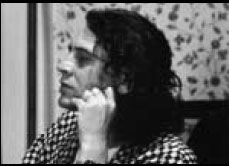about the production
(Detective poem based on 2-3 novels by Georges Bernanos)
Tobiáš, Nebeský, Dohnal – the playwright, the director, the music composer. These three individuals are the authors of JE SUiS. However, this is not their first cooperation, as we can also find their signature under the performance Marta (Theatre of Comedy, Prague, 2000). As for relations and inspirations – the spiritual lines lead from George Bernanos (1898-1948) to Bohuslav Reynek and Jan Čep, who was the first Czech to translate Bernanos’ works (Under Satan’s Sun, The Diary of a Country Priest), and from them to J. A. Pitínský, whose performances Sister Anxiety and Thirteen Songs also showed up on the programme of the International Theatre Festival Divadelna Nitra.
JE SUiS (I am) is not only the refrain in the search for one’s own identity, but as the name of this work also an anagram for salvation through mercy and sacrifice; TueS (you are) is not only the name of a town in France, but also an instrument for making contact with another being. And if that was not enough: the performance is directed by Mr. Nebeský („Heavenly” in English) and the title role played by Mr. Dobrý („Good” in English).
Tobiáš and Nebeský do not strive to tell the story (stories) on the stage, but from fragments of the whole they make a simultaneous and at the same time absent- minded, composition, by means of which they project the gloomy atmosphere of Bernanos’ world into current coordinates using post-modern methods of montage and correspondence between the lines... The authors and director of the play give preference to subtle hints of the means of imagery based on the basic elements and movements – fire, water, wine, mud... walking, descending, ascending... over psychological analysis and express reflection, and of course, music! No arias with accompaniment, but soft, passionate and ecstatic mental conversations between the characters in direct connection and a dialogue with the suggestively pathetic composer – piano player – actor Martin Dohnal.
Zdeněk Hořínek: The Unbearable Lightness of Sin, Lidové noviny, November 2001
creators
directed by Jan Nebeský
music: Martin Dohnal
set and costumes: Jana Preková
dramaturgy: Kateřina Šavlíková
photographer: Bohdan Holomíček
assistant director: Darina Korandová
characters and cast:
Pastor: Karel Dobrý, Daughter: Petra Špalková, Countess: Jorga Kotrbová, Serafita: Rozina Mlýnková, Detective: Jan Budař, Gabin: Miloslav Mejzlík, Doctor: Tomáš Palatý, Count: Vladimír Marek, Friend: Saša Rašilov, Passer-by: David Švehlík, Teacher: Martina Musilová, Violinist: Alena Miřácká, Violoncellist: Libor Mašek, Bell-ringer/piano player: Martin Dohnal
director

Jan Nebeský (1953)
It is difficult to find his place in the context of Czech theatre. His performances have certainly drawn their share of attention. Ibsen’s Ghosts or Shakespeare’s Hamlet (Divadelna Nitra Festival, 1995) became, without exaggeration, events which some young theatre actors and also spectators use to measure all future experience with theatre. The performance Martha (Mal d’or) is currently the last part of a trilogy which emerged during the past five years in the Theatre of Comedy. The first two parts are Beckett’s Endgame and Theresa – an original play by the Czech author Lenka Lagronová.
Czech critics have praised Jan Nebeský’s directorial work, by saying that they are performances which result in “encouraging spiritualization of the contemporary theatre”, and that they “return the notion of festivity to the Czech theatre”; they generally call his performances “endgames”, however, they also add that his performances are almost the most optimistic ones that you can find in the contemporary Czech theatre. This feeling arises from the fact that the performances develop various variations on a theme, that they are closely related, and support and enrich each other. This theme may be called the close connection between the arrogance and fragility of man. It is an attempt to capture a moment in life which is condemned to rapid termination as soon as it reaches its full extent or becomes perceptible. The stubborn search for a Friend on the muddy path of life, that everyone walks alone dragging his soul along.
